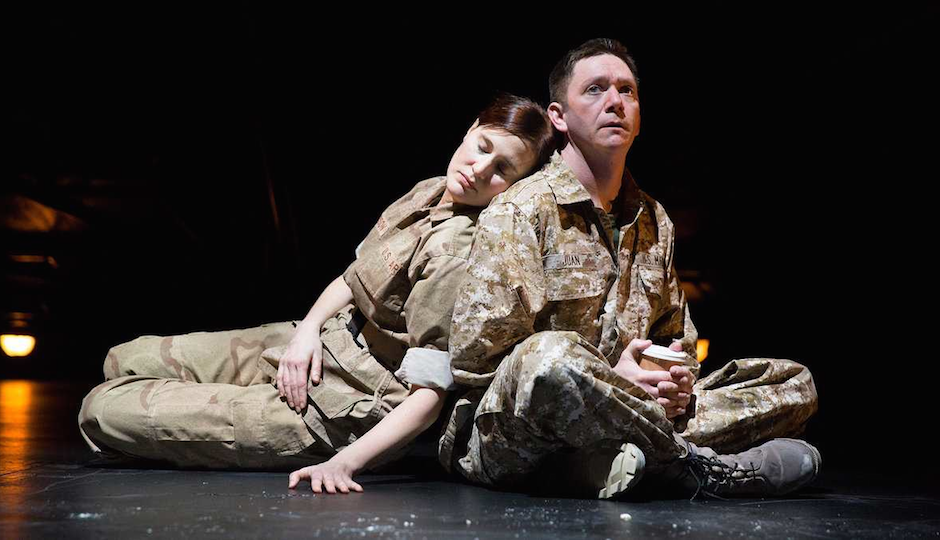Don Juan Comes Home From Iraq Sheds New Light on Buried Stories

Photo by Alexander Iziliaev
Don Juan is not in hell; he’s in purgatory. Well, he’s in Philadelphia, but it sure is infernal. The Wilma Theater’s latest, Don Juan Comes Home from Iraq, re-imagines the titular libertine as a returning Iraqi vet, searching for his lost love Cressida in a fire-and-brimstone iteration of Philadelphia. Here, he must battle his past and confront his present, which appear as hallucinatory jumps in space and time. The play, penned by Pulitzer-winner Paula Vogel and directed by Blanka Zizka, is beautifully staged and lit (courtesy of Matt Saunders and Thom Weaver) with brave, if somewhat incomplete, exploration of the moral conundrums of modern war.
This is not the first Don Juan to sleep his way through stage and story, but he is the one most achingly now. Vogel’s Captain Don Juan (played by Kieth J. Conallen with gruff vulnerability) updates the archetype. The revisited stock figure is still the hyper-sexual, hyper-masculine sinner whose exploits lead to his demise, but re-evaluated via modern gender discourse, and the divisive role of gender in the military. He’s ppapier-mâchéd from so many cut-up headlines and so many letters and reports strategically slashed and burned in the wake of the Iraq War. He is a proud Marine (Semper Fi!), and a “man’s man” — auto-defined as aggressively heterosexual — through and through. He’s also, expectedly, a womanizer, and less so, a lost soul.
The play delves into this tortured conscience, a product of PTSD and the crimes he (and by extension the American military) has committed and never atoned for. Its staging and cut-and-paste sequence of events attempt to formalize mental illness, to great effect, even if a few neurons misfire. His memories are preserved in Philadelphia’s Mütter Museum, where we see him meet, fall in love with, and verbally abuse the lovely Cressida. She enlists, joins his platoon, and challenges his claim that women cannot be real soldiers. All this while watching her commanding officer philander, abuse power, and butcher some military pick-up lines — none of which are mutually exclusive.

Kate Czajkowski and Keith J. Conallen. Photo courtesy of Alexander Iziliaev.
It’s this past of misdeeds that manifests as specters of a guilty conscience. Don Juan’s ghosts and demons wander the streets of Philadelphia, catching up with our broken hero to haunt, to tempt, to remind of the things he hopes to forget. He’s done some terrible things, including an egregious seize of power that acts as the play’s fulcrum, formally and thematically. But he’s also followed by the enormities he could not control — war and death. Much of his undoing is of his own doing, but damned though he is, he’s not wholly castigated. His limbic navigation of memory and dream is classic DSM Post-Traumatic Stress Disorder, but also a broader musing on how the past lingers and tortures. And, as an archetypal figure, it’s not just his past but the past. The morality of war is less explored than the morality of people at war. Does the cry of “Semper Fidelis” that links these marines set them up for betrayal? Does power over others instigate Habeus Corpus in its most literal sense?
The ambiguous morality and kaleidoscopic framing is formalized in the rotating stage, which hides and highlights cinematically, mimicking deep and narrow focus of a camera lens. A great theater of war soon becomes a dwarfed hovel where Don Juan takes his women. The shifting focus allows players who aren’t central to the scene to remain in soft focus, lingering on stage like whispers of memories or an overlooking chorus. It’s a great exercise in semantic staging — like the story of Don Juan, this play is literally timeless, its space and time co-existing, unfolding, collapsing within the dynamism of the staging.
In light of recent talk of the too-long covered-up military-sexual misconduct (a much-too-euphemistic description of the horrible reports of rape and harassment), Don Juan hits at very current, very urgent issues. It’s one part of the grand tradition of military sexism, an issue bravely taken up by the play but not wholly explored. Yes, it is a much-needed examination of sexism and the egregious prevalence and presence of rape in the military, but if fails to assign proper blame. To linger too much on the guilt and shame associated with Don Juan’s violation would skew the broader picture — this is an examination of war and its aftermath at large. Yet, because the issues of rape, gender, and sexuality in the military have been so long buried and so deeply felt, Don Juan’s apology or lack thereof feels incomplete.
As it wavers between past and present, real and imagined, the play also varies in tone, treating its weighty subject with occasional levity. Much of this is provided by an outstanding supporting cast, who play multiple roles without slipping out of rank. Some of its lighter moments feel forced and amateurish, like cartoonish portrayals of teenagers and punks, and a vaguely cheesy musical montage accompanying the boy-meets-girl side story. References to Philadelphia were almost universally cheered, but a few seemed like the response was their only purpose. Still, in its breadth of exploration, Don Juan has more hits than misses. It is a surreal exploration of men and women lost or broken by war, and the often futile attempts to reconcile. Right there in its title is a misdirect: Don Juan never really comes back.
Don Juan Comes Home From Iraq runs through April 20th. For tickets, go here.


